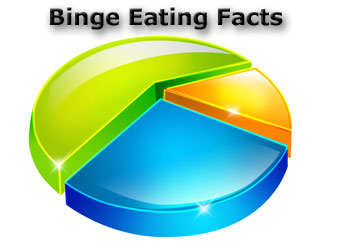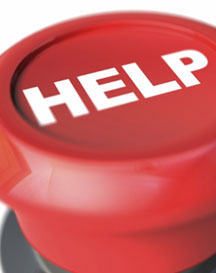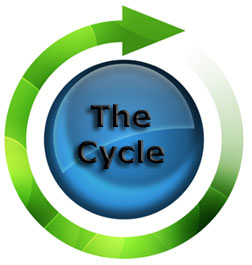Compulsive Overeating Disorder
Binge Eating Facts and How to Gain Control
Do you struggle with overeating? Find out more about Compulsive Overeating Disorder as well as some binge eating facts to learn how to stop binge eating.
The Vicious Cycle of Compulsive Eating Disorder
Since starting this website on abs exercise advice, I have often wondered why so many people have difficulty losing weight and keeping it off. There are probably many different reasons. But, one thing that keeps coming to my mind lately is food addiction, gluttony, binge eating, emotional overeating or what they have now defined as Compulsive Eating Disorder.
I realize everyone is different and so not everyone that struggles with losing weight deals with this. But, I have to believe many do. I wonder if sometimes when we are feeling depressed, instead of dealing with the emotion, we try to mask it with food. I know I do this sometimes. There's a certain ice cream and candy store in our town that has incredible chocolate covered ice cream bars. And when I feel down or anxious, I find that I start craving these bars! Food can be a mood altering substance, especially foods high in carbs and sugar.
However, those who struggle with an overeating disorder also tend to feel a lot of shame or disgust at themselves afterwards. Which then can just cause the cycle to continue.

A Few Binge Eating Facts
Did you know...
"Nearly 10 million females and 1 million males in the U.S. are battling eating disorders such as anorexia and bulimia, while millions more suffer from binge eating disorder.
The peak onset of eating disorders occurs during puberty and the late teen/early adult years, but symptoms can occur as young as kindergarten.
More than one in three normal dieters progresses to pathological dieting." (1)
How Many People Have Compulsive Overeating Disorder?
Therefore, assuming a population of 300,000,000 Americans...you would have 5,250,000 women with Compulsive Overeating Disorder (or Binge Eating Disorder) and 3,000,000 men with Compulsive Overeating Disorder (or Binge Eating Disorder)(2)
Let's Define a Compulsive Overeating Disorder
Here are a few definitions of Binge Eating Disorder (also known as compulsive overeating disorder):
- "Characterized primarily by periods of uncontrolled, impulsive, or continuous eating beyond the point of feeling comfortably full. While there is no purging, there may be sporadic fasts or repetitive diets and often feelings of shame or self-hatred after a binge. People who overeat compulsively may struggle with anxiety, depression, and loneliness, which can contribute to their unhealthy episodes of binge eating. Body weight may vary from normal to mild, moderate, or severe obesity."(3)
- "Binge eating episodes not accompanied by purging at least 2 times per week and occurs in approximately 30%-50% of subjects in weight control programs (40% are males)." (4)
- "Characterized by the most common weight issue Americans face - obesity. However, not all obese people have BED. The pathological behavior of obsessing over food is characteristic of all eating disorders. In BED, food is used as a drug or medication to cover or hide emotional pain. Food choices, quantities, and macronutrient variety tend to be consumed in large amounts out of synchrony with the body's needs. Activity is low. The imbalance leads to fat deposition."(5)
Symptoms of Binge Eating
- "Rapid weight gain
- Eating large quantities of food even when not hungry
- Disgust and shame after overeating
- Depressed and anxious mood
- Eating food to the point that one is uncomfortable and even in pain
- Going from one diet to the next constantly
- Feeling out of control over food
- Eating late at night
- Hiding food around the home, anticipating the binge
- Does not use any measures (whatsoever) to purge the binged food
- Constant weight fluctuations
- Sexual avoidance
- Exhibits an abnormally low self-esteem
- Attributes any successes or failures to weight
- Avoids many social situations
- Uses food as a "drug": self-medicate" (6)
A Few of My Recommended Resources To Stop Binge Eating:
 Whether or not you struggle with compulsive overeating disorder or just struggle with overeating from time to time, here are some excellent resources to help you address some of the emotional and spiritual issues.
Whether or not you struggle with compulsive overeating disorder or just struggle with overeating from time to time, here are some excellent resources to help you address some of the emotional and spiritual issues.
"One of the reasons we want to overeat is because the human heart craves fullness and satisfaction. There are, of course, many other reasons why we wish to overeat, such as the desire for comfort, to "medicate" pain, to help with loneliness and boredom, or just plain laziness." (7)
But, until you get to the root of the problem, which I believe is a spiritual and emotional emptiness, all other attempts at getting help will be powerless over your desire for eating and to feel satisfied.
These following resources will address the emotional and spiritual issues.
- The Lord's Table: Free online Bible based study on overeating, getting to the root of the problem (spiritual and emotional issues)
- A Hunger for God: A book on fasting and prayer by John Piper.
Other Resources for Help to Stop Binge Eating:
Share Your Story...
Share Your Story About Compulsive Eating
How has overeating impacted your life? What have found helpful to stop binge eating and gain control again of your life? Share your story here.
What Other Visitors Have Said About Compulsive Eating Disorder
Click below to see contributions from other visitors to this page...
Compulsive Overeating Disorder Sources:
(1) http://www.nationaleatingdisorders.org/in-the-news/
(2) http://www.eatingdisorderscoalition.org/documents/Statistics_000.pdf
(3) http://www.nationaleatingdisorders.org/nedaDir/files/documents/handouts/WhatIsEd.pdf
(4) http://www.eatingdisorderfoundation.org/EatingDisorders.htm
(5) http://www.edct.net/bingeeatingdisorder.aspx
(6) http://www.eatingdisorderinfo.org/TypesofEatingDisorders/BingeEatingDisorders/tabid/988/Default.aspx
(7) The Lord's Table Study
***righttop.shtml***
***navigation.shtml***
Copyright © 2004-2013 Abs-Exercise-Advice.com - All Rights Reserved.
 Return to top
Return to top


 Whether or not you struggle with compulsive overeating disorder or just struggle with overeating from time to time, here are some excellent resources to help you address some of the emotional and spiritual issues.
Whether or not you struggle with compulsive overeating disorder or just struggle with overeating from time to time, here are some excellent resources to help you address some of the emotional and spiritual issues.